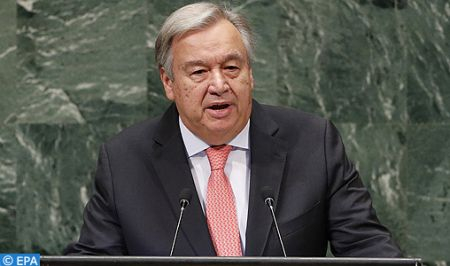Sahara: UN Secretary-General Debunks Algeria’s Fallacious Assertions on So-called Referendum
In his latest report to the Security Council on the Sahara issue, United Nations Secretary-General Antonio Guterres has once again debunked the lies repeated ad nauseam by Algeria about the so-called referendum. In his observations and recommendations, Guterres highlighted the need to achieve a mutually acceptable political solution on the exclusive basis of the resolutions adopted by the Security Council since 2018, including resolution 2654 of October 2022. Furthermore, all Security Council resolutions and Secretary-General reports for more than two decades have made no reference to the so-called referendum, which is dead and buried and exists only in the imagination of the enemies of the Kingdom’s territorial integrity. Security Council resolutions since 2018 have called for a political, realistic, pragmatic, lasting and compromise solution to this regional dispute, to which Algeria is the main party. The same resolutions, like all those that preceded them since 2007, establish the primacy of the Moroccan Autonomy Initiative, as the only serious and credible solution to this dispute inherited from the Cold War. The same resolutions have established, since 2018, the round table process with the participation mainly of Morocco, Algeria and Mauritania, as a unique framework for implementing the exclusively UN political process. In the same vein, Guterres stressed that a solution to this conflict is possible provided that “all parties concerned”, particularly Algeria, commit in good faith, with realism and in a spirit of compromise, in the facilitation effort led by his Personal Envoy, Staffan de Mistura, in continuation of the dynamic of the round tables initiated by his predecessor. The achievement of a negotiated political solution is thus enshrined in this new report of the Secretary-General, as in previous reports and Security Council resolutions for about twenty years, as the only path towards achieving a solution to this artificial regional conflict. Furthermore, the UN Secretary-General stressed that the role of Algeria remains crucial in achieving a political solution to the Sahara issue. While reiterating his “concern over the deterioration of relations between Morocco and Algeria”, Guterres renewed his calls for a “return to normality in relations between the two countries with a view to creating a climate conducive to peace”. The direct link established at the highest level of the UN between the quest for a just, lasting and mutually acceptable political solution and the deterioration of relations between Morocco and Algeria, demonstrates, once again, if necessary, Algeria’s responsibility in perpetuating this regional conflict. Indeed, Algeria cannot shirk its political, historical and moral responsibilities, not only in the creation, ex nihilo, of this conflict, but also in its perpetuation by the blocking of UN efforts aimed at a political solution and by the multiplication of hateful and hostile unilateral acts having caused a deliberate deterioration of relations between the two brotherly countries.

